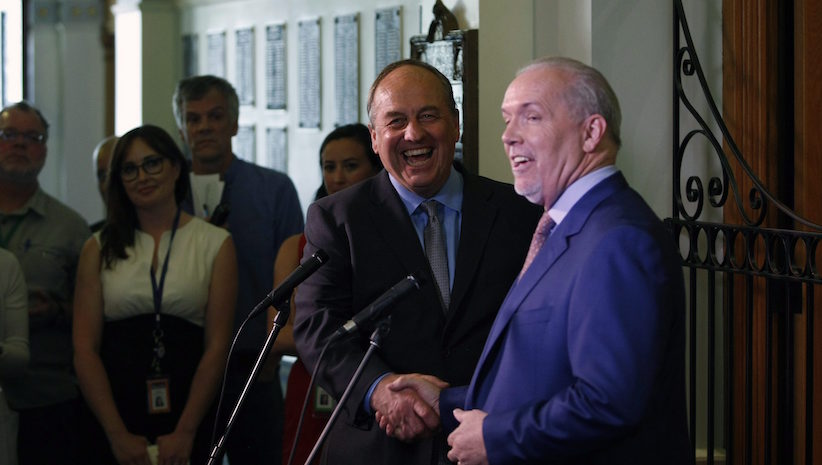What the B.C. NDP-Green deal means for rest of Canada
The parties have promised four years of a stable minority government. But at what cost to Ottawa (and Alberta’s) resource plans?
B.C. Green party leader Andrew Weaver and B.C. NDP leader John Horgan speak to media after announcing they’ll be working together to help form a minority government during a press conference at Legislature in Victoria, B.C., on Monday, May 29, 2017. (Chad Hipolito/CP)
Share

With a handshake, Canada’s natural resources industry was pulled into a state of uncertainty.
British Columbia’s NDP is set to lead a minority government with the backing of the Green Party, the leaders of both parties announced Monday afternoon, meaning 16 years of Liberal government on the west coast will soon come to end.
“In the end, we had to make a difficult decision,” Green Party leader Andrew Weaver said. “A decision we felt was in the best interest of British Columbia today, and that decision was for the B.C. Greens to work with the B.C. NDP for a stable minority government over the four-year term.”
Stability for B.C., maybe, but the rest of country is left wondering what will happen to the pipelines, infrastructure and energy projects approved by the previous government.
Though no details were divulged regarding what give-and-take was required for Weaver and NDP leader John Horgan to reach a deal—both sides promised more details on Tuesday—there’s a lot at stake. Especially in Alberta.
Both parties made clear their opposition to the Kinder Morgan Trans Mountain pipeline expansion project during the election run, and the NDP’s Horgan has said he’s open to shutting down the controversial Site C hydroelectric dam. He also explicitly opposed the Pacific Northwest LNG project before the campaign officially launched, but tempered his position closer to the election.
Horgan’s new Green ally, Weaver, is keenly opposed to the three energy projects—all of which would impact Alberta to varying degrees: Energy produced from Site C could support Alberta as it weans itself off coal power; contractors from Alberta would presumably get work from the LNG project; and the expansion of the Trans Mountain pipeline carrying oil from Alberta could add $1 billion to the economy and nearly 34,000 jobs annually for 20 years, with Alberta being the main benefactor.
Alberta Premier Rachel Notley (who had yet to comment on the announcement at the time of publication) delivered a strongly worded message at a news conference earlier this month in light of uncertainty surrounding B.C.’s election results and the fate of the Kinder Morgan pipeline. “I fundamentally disagree with the view that one province or even one region can hold hostage the economy of another province. Or in this case, the economy of our entire country,” said Notley, whose government supported the pipeline expansion from Edmonton to a port in Burnaby, B.C.
Brian Jean, the leader of the Wildrose Party in Alberta, likewise expressed his concern over the agreement. “Premier Notley must send a strong message that the government in B.C. and elsewhere around the country cannot block Alberta’s pipelines and interest,” Jean says. “It is not constitutional and it is not Canadian.”
And let’s not forget the federal Liberals and Conservatives are both very much in favour of the Kinder Morgan pipeline.
“To all Canadians, I want to say this: If I thought that this project was unsafe for the B.C. coast, I would reject it,” Prime Minister Justin Trudeau said in November. “This is a decision based on rigorous debate, on science and on evidence. We have not been and will not be swayed by political arguments, be they local, regional or national. We have made this decision because we are convinced it is safe for B.C., that it is the right one for Canada.”
Conspicuously omitted from Trudeau’s remarks were provincial political arguments—and rightly so, because this Green-NDP partnership is poised to put his resolve to the test.
“The Prime Minister approved the [Kinder Morgan] pipeline, but if he doesn’t champion it, it’s not going to get built,” says Mark Strahl, the federal Conservatives’ natural resources critic. “His enthusiasm for the pipeline stops in Calgary. I’ve seen him give speeches in Calgary and Houston, Texas, but he hasn’t done anything to promote it in British Columbia. Now he’ll be tested.”
(The Liberal Minister of Natural Resources, James Carr, was unavailable for comment.)
For the federal NDP and Green Party, however, the news was met with much enthusiasm.
Fantastic news! I look forward to a more progressive, cooperative and sustainable future for all British Columbians… https://t.co/GVXmp8futM
— Don Davies MP (@DonDavies) May 29, 2017
In addition to resources and pipelines, the partnership will also likely renew talks of proportional representation—a popular issue for the Greens—in future provincial elections.
“These issues aren’t going away,” said federal Green Party leader Elizabeth May. “The opportunity for real change is enormous.”
Now the rest of the country will have to come to grips with that.